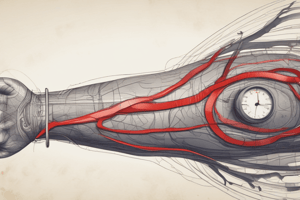Podcast
Questions and Answers
What is a common sign of hypovolemia related to electrolyte imbalances?
What is a common sign of hypovolemia related to electrolyte imbalances?
- Muscle cramps (correct)
- Nausea
- Back pain
- Headache
Which physical finding is suggestive of volume depletion in hypovolemic patients?
Which physical finding is suggestive of volume depletion in hypovolemic patients?
- Moist mucous membranes
- Increased skin turgor
- Dry mucous membranes (correct)
- High jugular venous distention
What symptom might a patient with severe hypovolemic shock experience due to coronary ischemia?
What symptom might a patient with severe hypovolemic shock experience due to coronary ischemia?
- Chest pain (correct)
- Joint pain
- Abdominal pain
- Headache
Which condition can be a result of brain malperfusion in hypovolemic patients?
Which condition can be a result of brain malperfusion in hypovolemic patients?
What is a common cause of non-hemorrhagic hypovolemic shock?
What is a common cause of non-hemorrhagic hypovolemic shock?
Which factor contributes to hemorrhagic shock, a cause of hypovolemia?
Which factor contributes to hemorrhagic shock, a cause of hypovolemia?
What is a potential cause of hypovolemia related to fluid volume loss?
What is a potential cause of hypovolemia related to fluid volume loss?
Which symptom is commonly associated with hypovolemia due to gastrointestinal fluid loss?
Which symptom is commonly associated with hypovolemia due to gastrointestinal fluid loss?
What is a possible sign of hypovolemia indicated by confusion and weakness?
What is a possible sign of hypovolemia indicated by confusion and weakness?
A patient with oliguria and decreased urine output is likely experiencing:
A patient with oliguria and decreased urine output is likely experiencing:
What are common symptoms of dumping syndrome?
What are common symptoms of dumping syndrome?
Which type of bariatric surgery is associated with a BMI requirement of 30 with other conditions?
Which type of bariatric surgery is associated with a BMI requirement of 30 with other conditions?
What is a key postoperative consideration following bariatric surgery?
What is a key postoperative consideration following bariatric surgery?
Which complication of hemorrhage occurs following bariatric surgery?
Which complication of hemorrhage occurs following bariatric surgery?
What intervention is recommended for managing dumping syndrome?
What intervention is recommended for managing dumping syndrome?
Which vital sign is crucial to monitor in patients post-bariatric surgery for potential complications?
Which vital sign is crucial to monitor in patients post-bariatric surgery for potential complications?
Study Notes
Hypovolemia: Signs, Symptoms, and Causes
Hypovolemia is a condition characterized by a significant loss of fluid or blood, leading to a decrease in the effective circulating volume and systemic hypoperfusion. It can result in a range of symptoms, from mild to severe, and if left untreated, can lead to life-threatening complications such as hypovolemic shock.
Signs and Symptoms of Hypovolemia
The signs and symptoms of hypovolemia are related to volume depletion, electrolyte imbalances, and acid-base disorders. Patients may complain of thirst, muscle cramps, and orthostatic hypotension. Severe hypovolemic shock can result in mesenteric and coronary ischemia, causing abdominal or chest pain. Agitation, lethargy, or confusion may result from brain malperfusion. Physical findings suggestive of volume depletion include dry mucous membranes, decreased skin turgor, and low jugular venous distention.
Causes of Hypovolemia
Hypovolemia can be caused by various factors, including:
- Hemorrhagic shock: This is due to an overt loss of blood, such as from trauma, surgery, or internal bleeding.
- Non-hemorrhagic hypovolemic shock: This is caused by fluid losses, which can be due to gastrointestinal, renal, open wounds, or third-spacing.
Management of Hypovolemia
Management of hypovolemia involves identifying the etiology, ruling out other forms of shock, and prompt volume replacement to minimize tissue ischemia. Treatment includes addressing the cause of fluid loss, such as blood replacement for hemorrhagic shock, and fluid resuscitation through intravenous fluids.
In conclusion, hypovolemia is a serious condition that requires prompt recognition and management to prevent life-threatening complications. Early recognition and appropriate treatment are crucial for successful outcomes.
Studying That Suits You
Use AI to generate personalized quizzes and flashcards to suit your learning preferences.
Description
Test your knowledge on hypovolemia, a condition characterized by a significant loss of fluid or blood. Learn about the signs, symptoms, and causes, as well as the management of this serious condition to prevent life-threatening complications.




